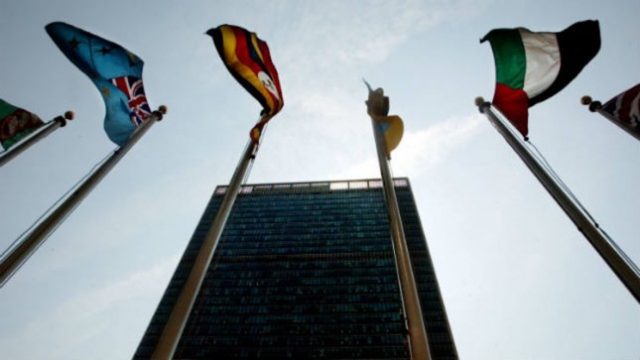In Paris last month, diplomats reaffirmed their support for a just, lasting and comprehensive resolution of the Israeli-Palestinian conflict. So they said.
Yet, they once again failed to discuss the single most important obstacle to attainment of that goal: the insistence of even “moderate” Palestinians of the Fatah party on an alleged “right of return.”
That is the term used to call for the mass migration to Israel of more than 5,000,000 persons of Palestinian Arab ancestry, 99 percent of whom are not refugees but rather descendants of refugees. This “return” would end the existence of Israel as a majority Jewish state and instead establish a Palestinian Arab country “from the [Jordan] River to the [Mediterranean] Sea.”
The envoys, including then-Secretary of State John Kerry, appeared unmindful of the fact that the United Nations has for the past 67 years maintained an agency meant to provide humanitarian support for the original refugees—now estimated at 50,000 or fewer—but that for decades has compounded the problem. This is the U.N. Relief and Works Agency, UNRWA. It operates programs offering assistance to all descendants of these refugees along the male line, including these days their great-grandchildren.
UNRWA was established as a temporary measure just after Israel’s 1948-1949 War of Independence. It was to provide short-term humanitarian assistance to the estimated 420,000 to 650,000 Arab refugees from what became Israel. (More than 800,000 Jewish refugees fled Arab countries, nearly 600,000 being absorbed by the new Jewish state.)
The United Nations also passed several resolutions in the months and years just after the ’48-’49 war, recommending but not requiring the return of Arab refugees to Israel “when practicable,” assuming their willingness to live in peace with the Jews. If that proved not practicable, the resolutions further recommended absorption of those refugees into the nearby Arab states to which they had fled and compensation for their losses. The Arabs rejected these recommendations.
Over the years, UNRWA has helped prolong the refugee problem it was created to resolve. A self-perpetuating bureaucracy, UNRWA also functions as an employment agency with a reported 30,000 staffers—most Palestinian and some having come from terrorist groups like Hamas. It boasts an annual budget of $1.3 billion, of which American taxpayers provide $400 million.
In the 2014 Gaza Strip war between Hamas, Palestinian Islamic Jihad and other terrorist organizations and Israel, UNRWA facilities—including schools and clinics—served wittingly or unwittingly as weapons depots and launch pads or as “shields” against retaliation for attacks staged from adjacent properties. During periods of quiet, anti-Israeli, anti-Jewish curricula in UNRWA schools have indoctrinated future generations of rejectionists and terror recruits.
There is no doubt that simply abolishing UNRWA would overburden Jordan and the Palestinian Authority with the responsibility to support these persons of Palestinian ancestry who have not yet been fully integrated into the countries in which they live. That is why, for both political and humanitarian reasons, it would be appropriate for the United States to call for UNRWA to be folded into the office of the U.N. High Commissioner for Refugees, and insist on designating its $400 million UNRWA allocation to the UNHCR.
Further, the United States should require that Palestinian Arab refugees be treated like all other displaced groups. None of them can bequeath refugee status—and the material, financial and diplomatic support that comes with it—to future generations. Finally, the United States should insist UNRWA-enabled anti-Israel, anti-peace curricula not migrate to UNHCR.
Unlike many other U.N. resolutions dealing with Israelis and Palestinians in Orwellian ways, merging UNRWA into UNHCR could foster an atmosphere conducive in the long run to peace.


